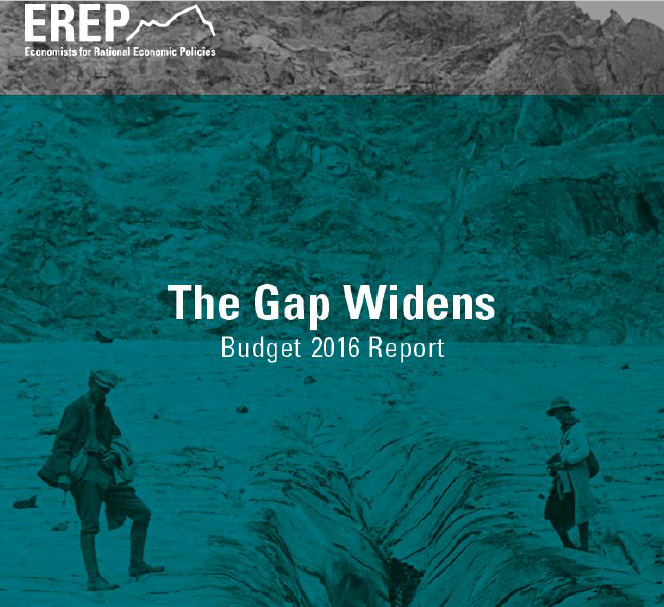The EREP network – Economists for Rational Economic Policies – has today published its Budget 2016 Report, “The Gap Widens”. It comprises a series of short articles assessing the state of the economy and public finances, and the likely responses of Chancellor George Osborne.
The full Report is available here
Jeremy Smith, Co-convenor of EREP, commented
“A large gap has opened up between official forecasts by the Chancellor and OBR of the size of the economy, as recently as last November, and the reality that the economy is considerably smaller. This means that there is also a bigger gap in the public finances than forecast – not despite but because of the low-pay, low investment austerity policies of the current and previous government. Above all, there is a growing gap in the economic and political credibility of the Chancellor. It’s time to change course.”
Some key messages from the report:
The Chancellor has claimed that Britain’s economy in 2015 was “smaller” than forecast by £18 billion. However, we show that for the financial year 2015-16, the gap between what was anticipated by the OBR and most economists, and the almost certain outturn, is far bigger – at around £30 billion. This naturally has an adverse effect on the public finances, as a smaller economy produces lower tax receipts.
Furthermore, the economy’s new, lower starting point brings down the level of activity in future years, and will lead to a higher debt-to-GDP ratio than has been forecast.
The causes of this shortfall in the size of the economy are not the result of dangerous foreign “cocktails” or “headwinds from overseas”, but are mainly home-grown – from the Chancellor’s own economic policies – and predictable.
The impact this year (2015/16) on government receipts is likely to be a shortfall of £5 billion or more, and next year and thereafter, the shortfall – assuming existing policies continue – is likely to be significantly higher (from £9 billion per year upward)
Mr Osborne will react by announcing deeper cuts and stronger austerity. This is exactly the wrong reaction and will inevitably reinforce the current weakness in growth. This view is now accepted by, e.g., the IMF and the OECD.
A rational policy in a time of record low interest rates is for the government to borrow (at historically very low rates) to invest for the future of our country. Such investment will pay for itself by leading to higher growth and incomes (notably in the currently weak private sector) – leading also to higher government tax receipts.
After 6 years of the Chancellor’s policies, with the slowest recovery on record from a deep recession, it is time to change course.
There is a risk that the Chancellor will, for political rather than economic reasons, introduce inappropriate tax cuts mainly aimed to benefit the better-off, which would worsen the fiscal balance. This also risks being misused as an argument for further reductions in public services, and in benefits for the very poor and disabled, and generally for reducing the “size of the state”.
The report points out that back in December, EREP had clearly foreseen the problems that were to come. That report, “The cracks begin to show”, said this:
“More worryingly still, the rate of change in nominal GDP (i.e. current prices) in Q3 was also 2.1%. It is exceptionally rare for nominal GDP not to be greater than real GDP, and besides being an indicator of deflation, has a negative impact on the government finances…
These recent GDP and public finance figures were published just before Christmas – and just a few weeks after the November Autumn Statement and Spending Review. The Office for Budget Responsibility had – thanks to some assumptions on GDP and tax receipts that were queried by many as being over-optimistic – helped the Chancellor to sidestep short-term political problems over working tax credit by allowing a slower path to his promised budget surplus. Those OBR and government assumptions now suffer from considerable scepticism…”
Developments since then have reinforced our view, with both real GDP and nominal GDP falling well short of what had been officially forecast. The gap we predicted has opened wide.
The report’s authors include:
Ann Pettifor & Jeremy Smith on “The British economy is even “smaller” than the Chancellor asserts”
John Weeks on the Chancellor’s “Growing record in fiscal mismanagement”
Jo Michell on “A weakening economy, reliant on consumption and debt”
Graham Gudgin & Ken Coutts on “A history of missing fiscal targets”
Richard Murphy on “Tax in the 2016 budget”






